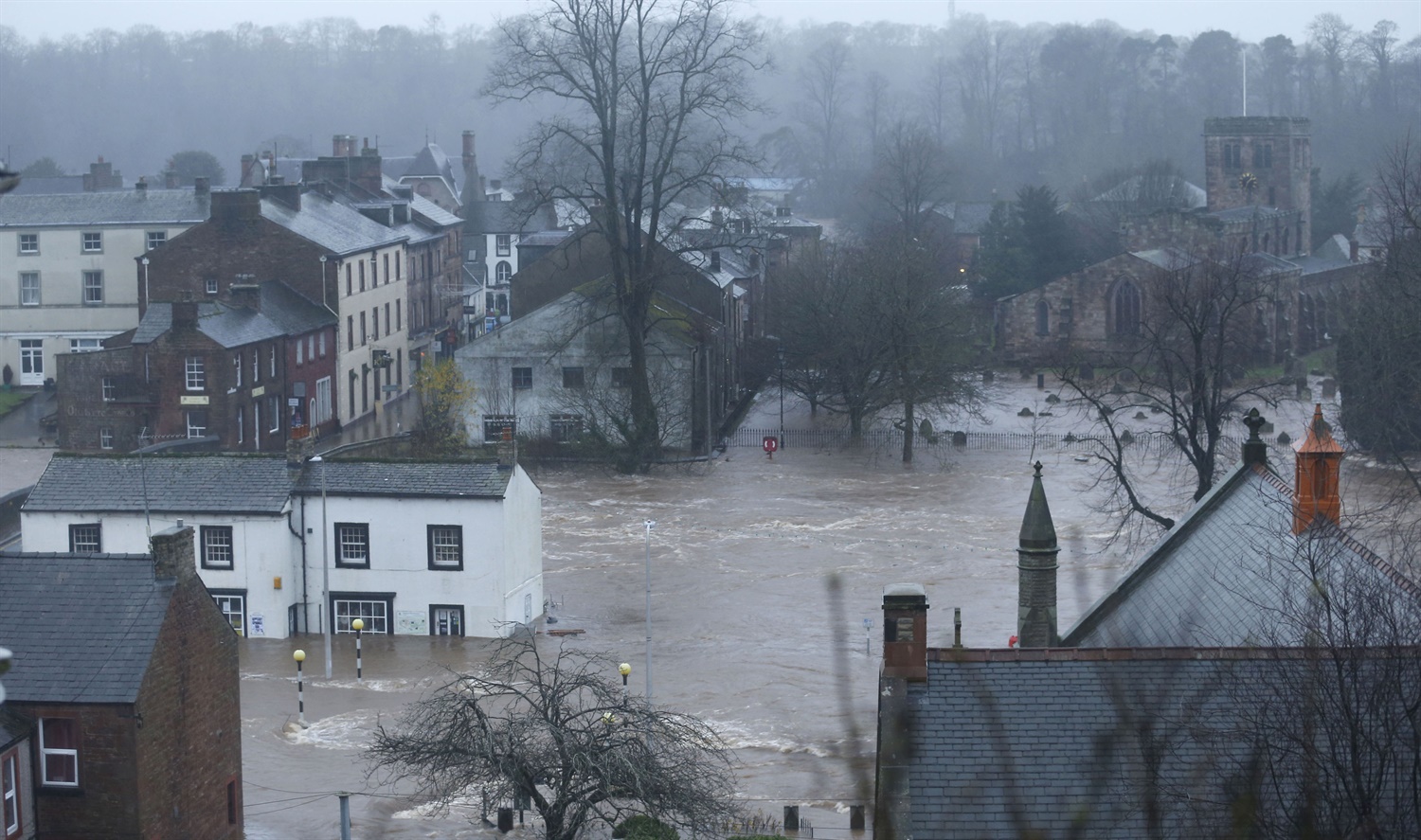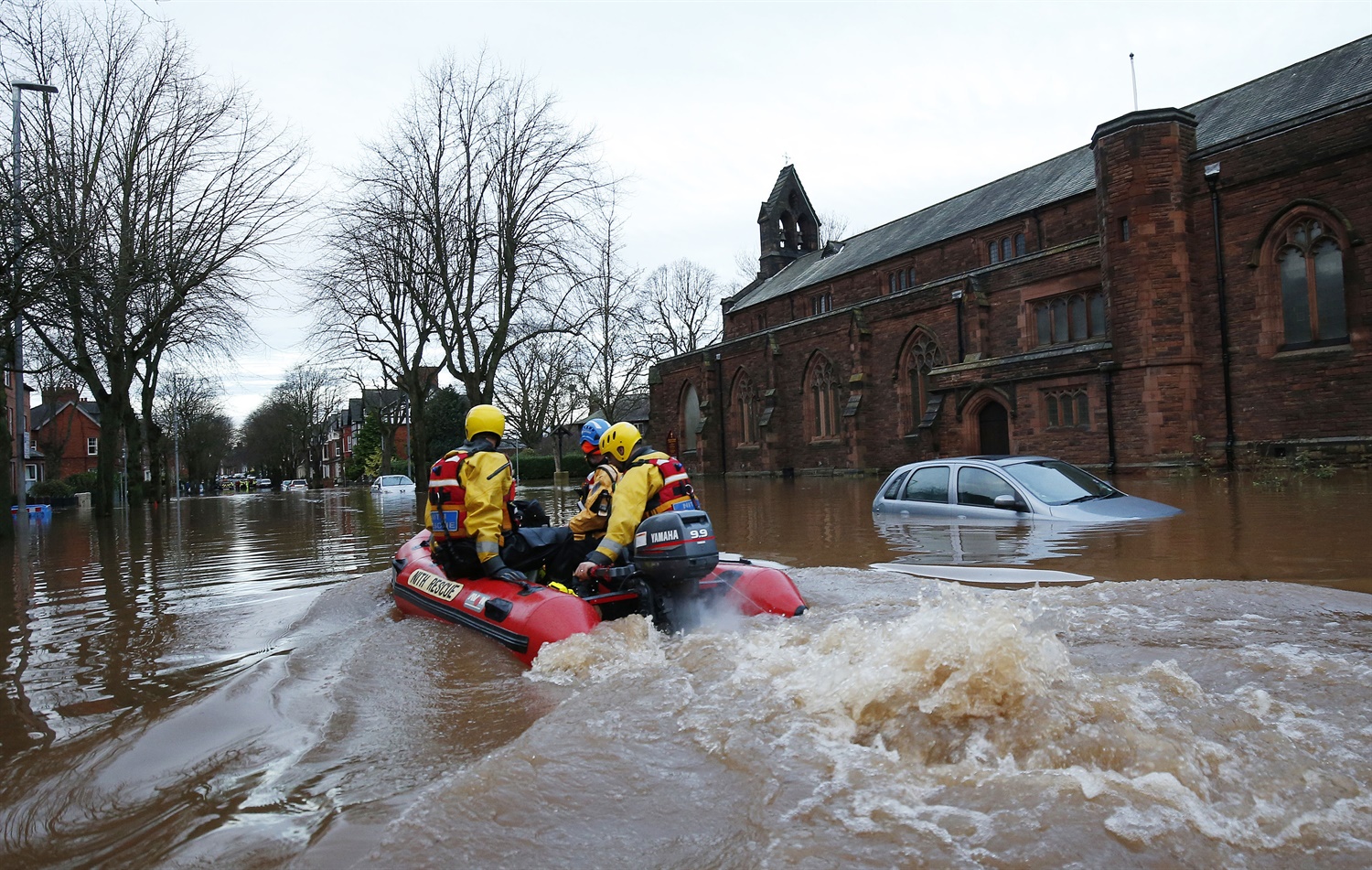07.12.15
Government grilled on flood defences after record rainfall drowns Cumbria
Prime minister David Cameron will chair a meeting of the government’s emergency Cobra committee this morning (7 December) to review the adequacy of existing flood defences after towns in north-west England were left under water after heavy rainfall in the weekend.
The Environment Agency issued 46 warnings of severe flood warnings in the north west, with a particularly worrying situation in Cumbria, where ‘Storm Desmond’ has shut down hospitals and schools and where displaced residents sought temporary shelter.
At least three bridges have been washed away in the Lake District and severe flooding has disrupted rail travel between England and Scotland via Preston. Over the weekend, the Met Office issued an amber warning for wind in parts of the north east and Scotland, with parts of the Pennines expected to see gusts of 70-80mph.
Cumbria County Council’s leader, Cllr Stuart Young, said on BBC Radio 4 Today this morning that the region already experienced floods in 2005 and 2009, but “nothing as massive” as this.
“One of the differences this time is it’s being over a much more extensive area of the county. We’ve had severe flooding from Kendal in the south, Appleby, Carlisle… it’s really stretched all the services, who’ve been working flat-out over the weekend,” he said.
According to Young, the Environment Agency spent £38m after the 2005 floods in Carlisle to improve defences, but the region is “now dealing with genuinely unprecedented levels of rainfall”.

The council has already mobilised 18 fire appliances to support more than 230 flood-related calls it received during the weekend, with firefighters rescuing people from vehicles trapped in the flood and trying to stop water from damaging properties.
Young continued: “They’re going to have to rewrite the record books about the highest level of rain recorded, and I don’t know that anybody could’ve predicted the levels of rain that we’ve seen in the past couple of days. As we’re moving to the recovery phase, our thoughts are with the people who’ve lost their homes and we’ll be helping them as much as we can – but there needs to be an investigation into the flood defences.
“I’ll be talking to local MPs later today and if the Environment Agency needs to revisit them, that’s what’s going to happen. We can’t continue to have events like this in Cumbria, we just won’t be able to cope.”
Sir James Beven, CEO of the Environment Agency, agreed that the extent of the rainfall had been unprecedented, with over a foot of rain falling over 24 hours in Cumbria – more than the monthly average and “most certainly a record”.
“When that happened the rivers rose to such a level, in some parts of the Cumbria they overtopped our flood defences,” he said
But in light of criticism that the Environment Agency’s existing defence strategy is not enough to cope with such disasters, Beven said: “In those areas where water did overtop the defences, the fact that defences were there reduced the overall impact and extent of the flood, and gave people more time to prepare. So those defences did play a very important role.
“That doesn’t mean we don’t need to review what happened – we will – and we need to learn lessons for the future. You can never prevent all flooding; you can never protect everybody, everywhere, at all times, against flooding. And that’s why we prefer to talk about managing the risk of floods, to make sure we bring the risk to the lowest level, and the impacts to the lowest level – not preventing floods. Nature is nature.”
The Environment Agency is keen to prioritise the most urgent projects from a “long list of schemes” needed over the next five years, he said, working with local authorities and emergency services to enhance both the money and the expertise available locally.
Environment secretary Elizabeth Truss reiterated Beven's point that the existing defences and the "swift actions of emergency services" helped protect thousands of properties, but water in some areas rose to levels never before seen, overtopping defences in places.
Truss said she chaired a COBR (Cabinet Office Briefing Room) meeting yesterday (6 December) to ensure that "every possible resource is available to the emergency services and responders on the ground", adding: "Our thoughts are with those communities affected by this devastating flooding. We are expecting upwards of 2,000 homes and businesses will have been flooded. Some areas are experiencing power cuts while other are difficult to reach because of severe disruption to travel."

But Lib Dem leader Tim Farron, who is MP for South Lakeland in Cumbria and affected by the flooding himself, called on the government to provide extra funding to help Cumbria, on top of the £2.3bn confirmed during the chancellor’s Spending Review. Upping the existing defence cash pool, he argued, should be done as part of the chancellor’s Northern Powerhouse vision.
Since the rainfall started on Saturday, Electricity North West has restored mains power supply to all households in Lancaster, including the Royal Lancaster Infirmary – but there are still thousands of areas in Cumbria either relying on generators, such as the Cumberland Infirmary in Carlisle, or lacking power entirely.
Mark Williamson, its operations director, told BBC Radio 4 Today that the company will be participating in the government’s review into flood defences on the rivers, as well as reviewing its own strategy to see if there is anything it can learn from this disaster.
Electricity North West has been regularly updating its website and Twitter account with more information on the region’s power restoration.
(Images c. Owen Humphreys/PA Wire)